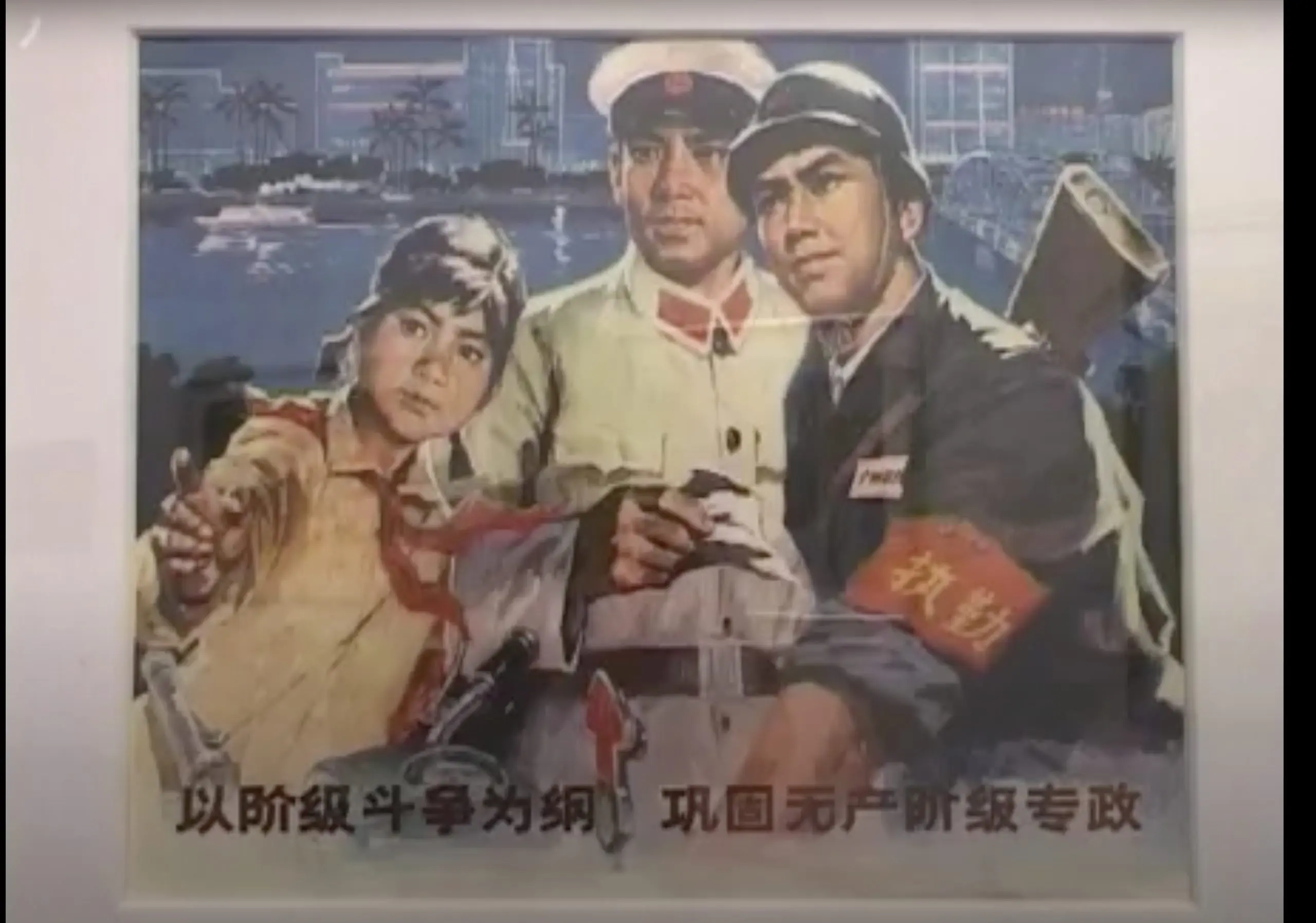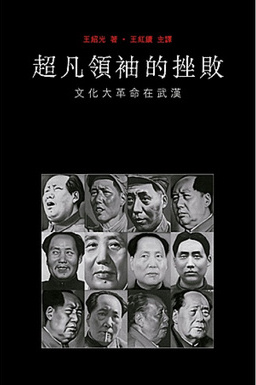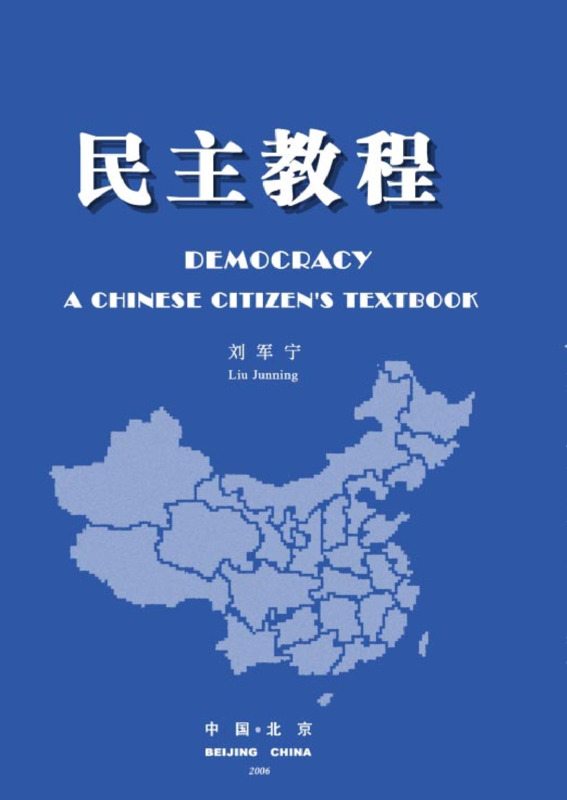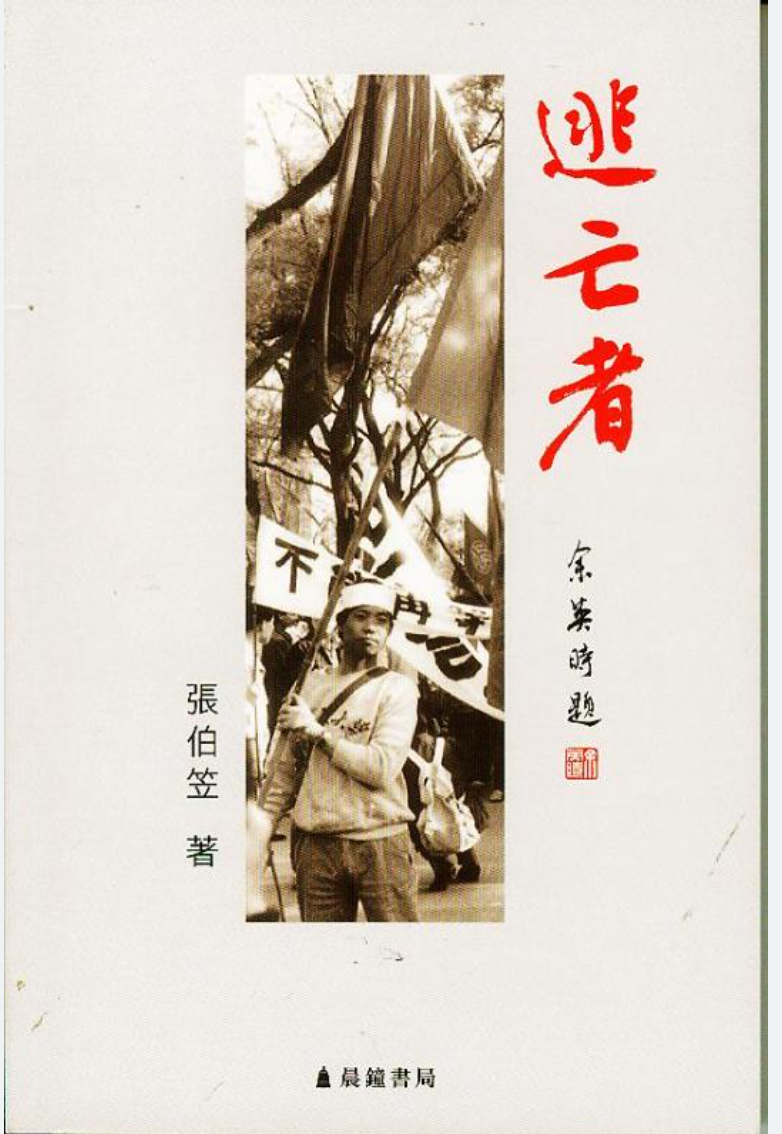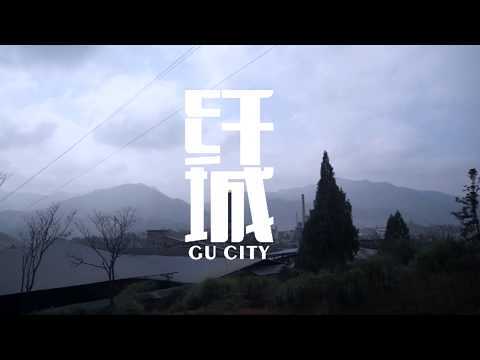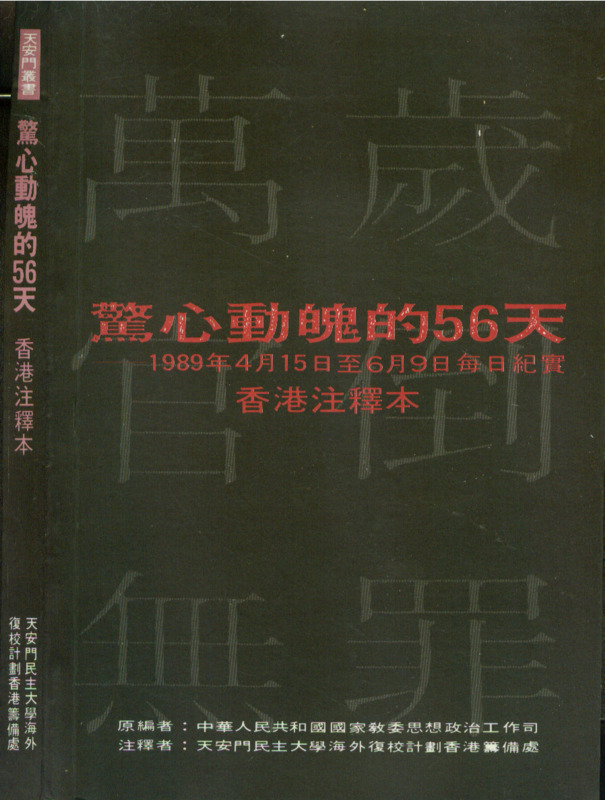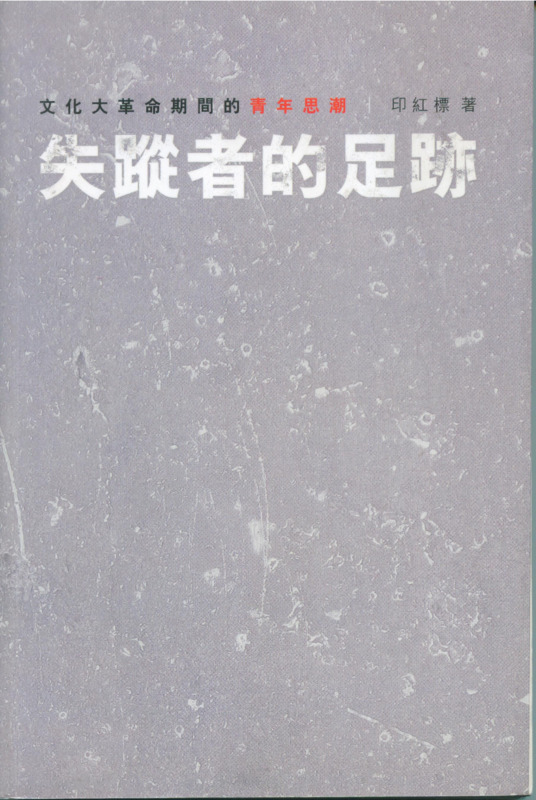Explore the collection
Showing 213 items in the collection
213 items
Book
Collected Papers of Wu Yisan (1)
Writer Wu Yisan is the founder of Hong Kong's May 7 Society, an organization dedicated to the collection, research and publishing of everything related to the anti-rightist campaign in 1957,to restore and present the truth about a period of history characterized by severe persecution of remedial intellectuals. Over the years, Mr. Wu has devoted himself to compiling The Dictionary of Names of 1957 Victims. As the Chief Editor of The Hong Kong May 7 Society Publishing House, he also published The Biography of the Rightists of the May 7.
This book is a collection of his political papers, comprising more than 50 published and unpublished essays primarily written between 2004 and 2009, criticizing CCP from various perspectives, including history, current affairs, and culture.
Book
Collected Papers of Wu Yisan (2)
Writer Wu Yisan is the founder of Hong Kong Five-Seven Society, an organization established in 2007 and dedicated to the collection, research and publishing of everything related to the Anti-Rightist campaign in 1957, to restore and present the truth about a period of history characterized by severe persecution of intellectuals. Over the years, Mr. Wu has devoted himself to compiling *[The Dictionary of Names of 1957 Victims](https://minjian-danganguan.org/collection/1957%E5%B9%B4%E5%8F%97%E9%9A%BE%E8%80%85%E5%A7%93%E5%90%8D%E5%A4%A7%E8%BE%9E%E5%85%B8)*. As the Chief Editor of The Hong Kong Five-Seven Society Publishing House, he also published *The Biographies of the 1957 Rightists* and *[New Biographies of the 1957 Rightists](https://minjian-danganguan.org/collection/%E2%80%9C%E4%BA%94%E4%B8%83%E2%80%9D%E5%8F%B3%E6%B4%BE%E5%88%97%E4%BC%A0%EF%BC%88%E4%B8%8A%EF%BC%89)*.
This book is a collection of Wu’s political essays, including nearly one hundred of his published and unpublished essays and speeches between 1999 and 2017, including historical and current affairs analyses, with an emphasis on commentaries of persecuted intellectuals and political dissidents. These people are often called "traitors of China (han jian)" by CCP, but Wu Yisan argues that the CCP is the real traitor that betrays the country and its people.
Our archive also hosts another anthology of his, *[Is Chen Yi a Good Comrade](https://minjian-danganguan.org/collection/%E6%AD%A6%E5%AE%9C%E4%B8%89%E6%94%BF%E8%AE%BA%E6%96%87%E9%9B%86%EF%BC%881%EF%BC%89)*?
Film and Video
Cultural Revolution Propaganda Posters
Through a large number of Cultural Revolution paintings, this film shows the official aesthetics at the time of the Cultural Revolution and the bloody violence and authoritarianism behind these paintings. The film features interviews with painters and Red Guards of the era as well as collectors and researchers in China and the UK today.
Official Documents
Declassified Files of the Canadian Government on the June Fourth Incident
This document, declassified in January 2015, contains a 1989 diplomatic memorandum from the Canadian Embassy in Beijing. It describes the circumstances surrounding the June 4 massacre as they were known to officials at the Canadian embassy.
The documents, declassified by the National Library and Archives of Canada, show the Canadian government's concern about the invasion of the embassy by Chinese troops. The documents also describe the crackdown in Beijing and how the troops killed citizens.
Book
Defeat of an Extraordinary Leader: The Cultural Revolution in Wuhan, The
This book covers the history of the Cultural Revolution in Wuhan and related analysis. Wang Shaoguang completed his doctoral dissertation of the same name (in English) in 1989, and the Chinese version of his abridged dissertation, *Rationality and Madness: The Masses in the Cultural Revolution,* was published by Oxford University Press in 1993. a Chinese version was published by The Chinese University of Hong Kong Press in 2009. Taking the Cultural Revolution in Wuhan as the main axis, the author interviewed dozens of participants in the Cultural Revolution, utilizing a large amount of original materials published during the Cultural Revolution. Combining all of this with his own personal experience, he profoundly reveals the masses' participation in the Cultural Revolution during winters, forms and laws, the mechanism of advancement and retreat, and its relationship to the general situation of the whole country.
Book
Democracy Curriculum
Written by Chinese liberal intellectual Liu Junning, this book circulated underground in 2006. The book parses the fundamentals of democracy as well as historical experience. It was quickly banned in China.
Book
Earthquake Insane Asylum
On May 12, 2008, when the Great Sichuan Earthquake struck, writer Liao Yiwu began to write "Chronicle of the Great Earthquake", which was serialized in <i>Democratic China</i> and reprinted on several Chinese websites. It had a wide impact. Liao went to Dujiangyan, Juyuan Township, Yingxiu and other earthquake-hit areas to conduct on-the-spot interviews. His travels and writings during the earthquake were reported and translated by many mainstream media.
In April 2009, Taiwan's Asian Culture Publishing published and distributed the traditional Chinese edition of <i>Earthquake Insane Asylum</i>, a pictorial and textual factual record that preserves the living conditions of the people during of the Sichuan earthquake.
Film and Video
East Wind State Farm
In 1957, two hundred teachers, students, and cadres from Kunming, Yunnan were among the hundreds of thousands of Chinese people labeled as “Rightists” for criticizing the Chinese Communist Party. They were sent to the East Wind State Farm, located in Mi-le County in Yunnan, for 21 years of “thought reform” in the countryside. These inmates witnessed the policies of the Great Leap Forward first-hand: they took part in deforestation, agricultural, and industrial projects in the countryside, which precipitated the Great Famine. Later, during the Cultural Revolution, their camp was visited by large groups of youths “sent down” from the cities, who worked on the farm with the “Rightists.” In 1978, these “Rightists” were finally rehabilitated and allowed to leave.
This documentary examines the policies and campaigns of the Maoist era through the eyes of those who were persecuted and exiled. Director Hu Jie pieces together this long and complex story through collecting dozens of extensive interviews with inmates as well as staff who served through decades of the camp’s existence. These people’s vivid memories and personal accounts shed light on the harrowing lifestyle of not only the two hundred “Rightists” of East Wind State Farm, but also the scores of dissidents and youths who experienced the Great Leap Forward and the Cultural Revolution.
Film and Video
Enemy of the State
On February 9, 2010, Tan Zuoren was tried in the Chengdu Intermediate People’s Court for the crime of inciting subversion against the state. Ai Xiaoming and her team recorded the three days before and after the verdict, the mindsets of Tan Zuoren’s friends and relatives, and how the lawyers carried out their work.
This film is in Chinese with Chinese subtitles.
Book
Escape From China: The Long Journey from Tiananmen to Freedom
Author Zhang Boli, a former student leader of the June 4 Democracy Movement, was ranked 17th on the "21 Most Wanted List." After June 4, Zhang Boli went into hiding in his hometown in Northeast China and crossed the border into the Soviet Union, where he was detained and repatriated by the Soviets. The Soviets did not hand him over to the Chinese border guards, but let him leave on his own. In the two years following June 4, Zhang Boli was the only June 4 pro-democracy leader who was neither captured by the Chinese Communist Party nor able to flee China. It was not until 1991 that Zhang Boli arrived in Hong Kong through secret channels and applied for political asylum at the U.S. Consulate. *Escape From China:The Long Journey from Tiananmen to Freedom* was published and translated into many languages. The English version won the Washington Post's "Best Book Award".
Film and Video
Faraway Mountain
This movie captures the lives of miners in small coal mines in the Qilian Mountain area of Qinghai Province. At 3600 meters above sea level, the air here is thin. Miners in the small coal kilns labor hard in a working environment without any protection, and usually get silicosis after 5-10 years of work, thus losing their ability to work. If they die in an accident, their families receive only meager compensation. This is a true record of the survival of China's grassroots laborers in the early 1990s.
Film and Video
Fiber City
Fiber City—the collective name Fujian Textile and Chemical Fiber Factory—was founded in 1971. China's first production in the 1970s, one of the nine Vinylon factories located in Yongan City, Fujian Province, deep in the mountains, 3 kilometers outside the outskirts of the industrial town. Once glorious, it has been gradually lowering its curtains. The old factory buildings are mottled, its young workers are now gray-haired, and many have left. The documentary shows the fate of this big factory during the planned economy.
Book
Fifty Years of the Chinese Communist Party
The author Wang Ming was an early member of the Communist Party of China (CCP) and the first of the "28 and a half Bolsheviks," who lost power after the Yan'an Rectification and were gradually marginalized by Mao. After the Yan'an Rectification, the Internationalists, led by him, lost power in the party. He was gradually ostracized by Mao Zedong, who expatriated him to the Soviet Union in 1956. In his book, Wang Ming recounts his decades-long feud with Mao. It provides a fascinating insight into the early history of the CCP.
Book
First Man against the Cultural Revolution and His Co-Conspirators, The
On August 8, 1966, the Central Committee of the Communist Party of China adopted the "Sixteen Articles" of the Cultural Revolution. Soon after, Liu Wenhui, a young mechanic in Shanghai who had been labeled as a "rightist" in 1957, wrote pamphlets and leaflets clearly opposing the Cultural Revolution, the "Sixteen Articles", and authoritarianism and tyranny. He was arrested on November 26 of that year. Four months later, he was executed for "counter-revolutionary crimes." Liu Wenhui became the first person known to have been publicly shot for opposing the Cultural Revolution. The author of this book, Liu Wenzhong, was Liu Wenhui's co-defendant and survived thirteen years in prison. In this book, Liu Wenzhong describes in detail his brother Liu Wenhui's ideology as well as how he was killed by the tyrannical government.
Book
Footprints of the Missing: Trends of Youth Thought During the Cultural Revolution
During the ten years of the Cultural Revolution, ideological control was extremely harsh. However, a small group of young people at great personal risk still carried out extremely serious study and thinking.
This book is a study of this group of young thinkers. Written by Yin Hongbiao (b. 1951), a professor of history at Peking University, it examines the lives and motivations of some of these contrarian thinkers. Instead of focusing on well known thinkers from the Cultural Revolution, such as Yu Luoke, Professor Yin seeks to rescue "missing persons" from history. These are not mainstream public intellectuals, but grassroots thinkers who challenge the mainstream. In this book, they include people such as Chen Erjin, a young man from the mountainous province of Guizhou, who in 1976 published an essay "On Privilege" that proposed protection of human rights and a western-style separation of powers.
The book also allows us to understand the thinking of young people from the middle of the last century. As the critic Hu Ping noted in a review of this book (https://www.rfa.org/mandarin/pinglun/huping/hp-11302009095820.html):
"The 19th-century Russian thinker Herzen wrote: 'Can future generations understand and evaluate all the horrors and all the tragic aspects of our existence? ... Oh, let future generations linger on before we sleep under the tombstone, let us meditate and pay our respects; we are worthy of their respect!' Reading "Footprints of the Missing" written by Dr. Yin Hongbiao of Peking University reminds me of Herzen's words."
Book
Fracture—Chinese society since the 1990s
This monograph by Sun Liping, a professor at Tsinghua University, was published by China Literature Publishing House in 2003. The author systematically analyzes a series of changes in Chinese social life since the 1990s. The book discusses the meaning and characteristics of fractured society; the formation and background of fractured society; widening income gaps and the formation of vulnerable groups; the new urban-rural dual structure; trust crisis and social order; social conflicts and institutional innovation, etc.
Book
Gan Cui: The Soul of Peking University-From Lin Zhao to the 1989 Democracy Movement
This book was originally published in the series *Micro Traces of the Past* - Documentary Volume - No. 6, edited by Huang Heqing, founded in 2007. Gan Cui, a student at Renmin University of China, was classified as a rightist in 1957. He became lovers with Lin Zhao, a rightist student who came from Peking University to work in the data room. Gan Cui was later sent to Xinjiang. When he returned, he learned that Lin Zhao had been killed. This book, 140,000 characters in total, is a manuscript of Gan Cui's memories of Lin Zhao in the context of the 1989 pro-democracy movement.
Film and Video
Garden of Paradise
The year 2003 was known as the birth of the Weiquan—the rights defense–movement, which was marked by the Sun Zhigang incident in Guangzhou. At the same time, a campaign began to get justice for Huang Jing, a teacher from Hunan who was sexually assaulted and killed by her boyfriend. The campaign involved the victim’s family, netizens, feminist scholars and activists, and lasted for several years. This documentary records the process of Huang Jing’s case from filing to post-judgement, and analyzes the broader issue of sexual violence against women in China.
The films in this series are in Chinese with Chinese subtitles.


